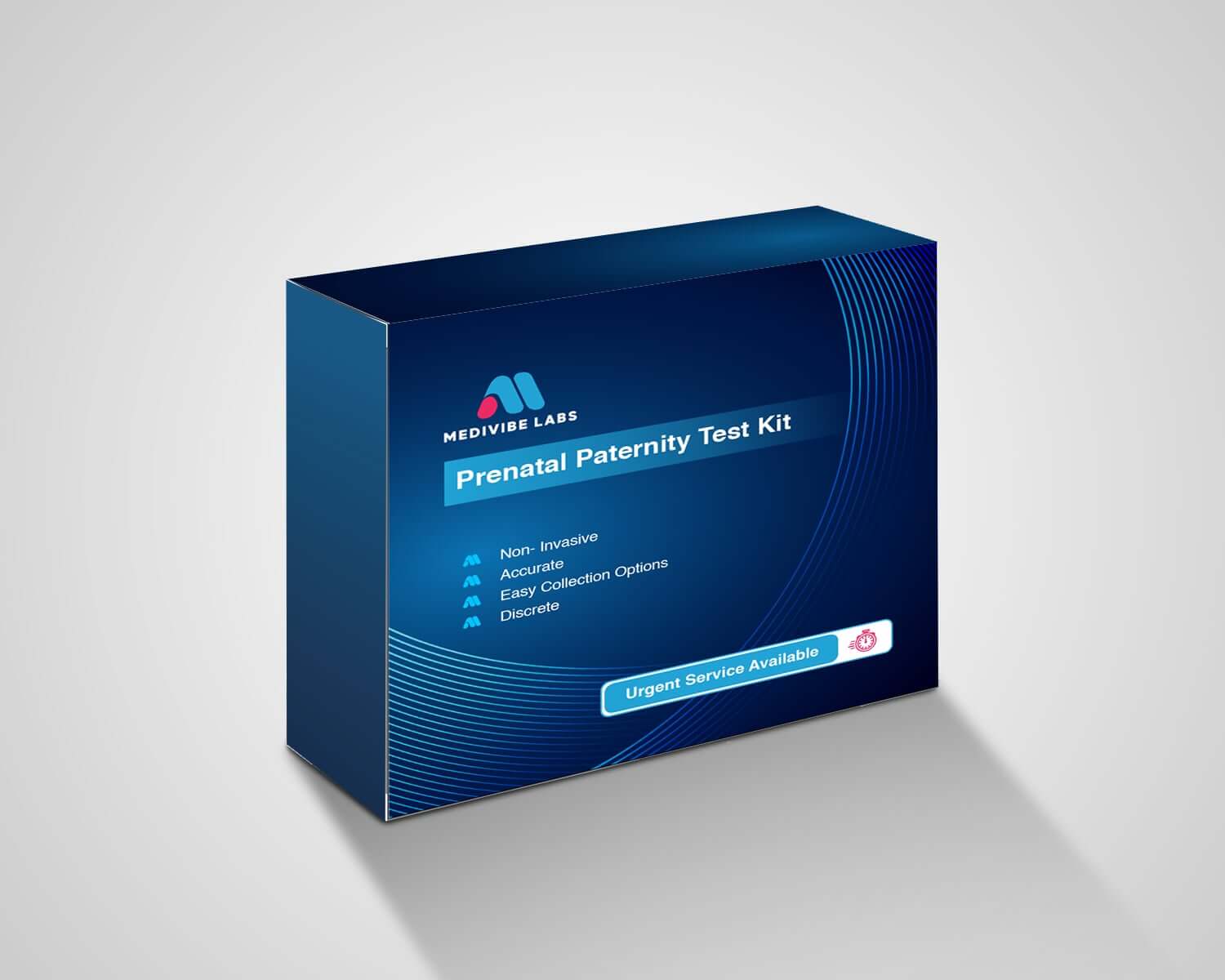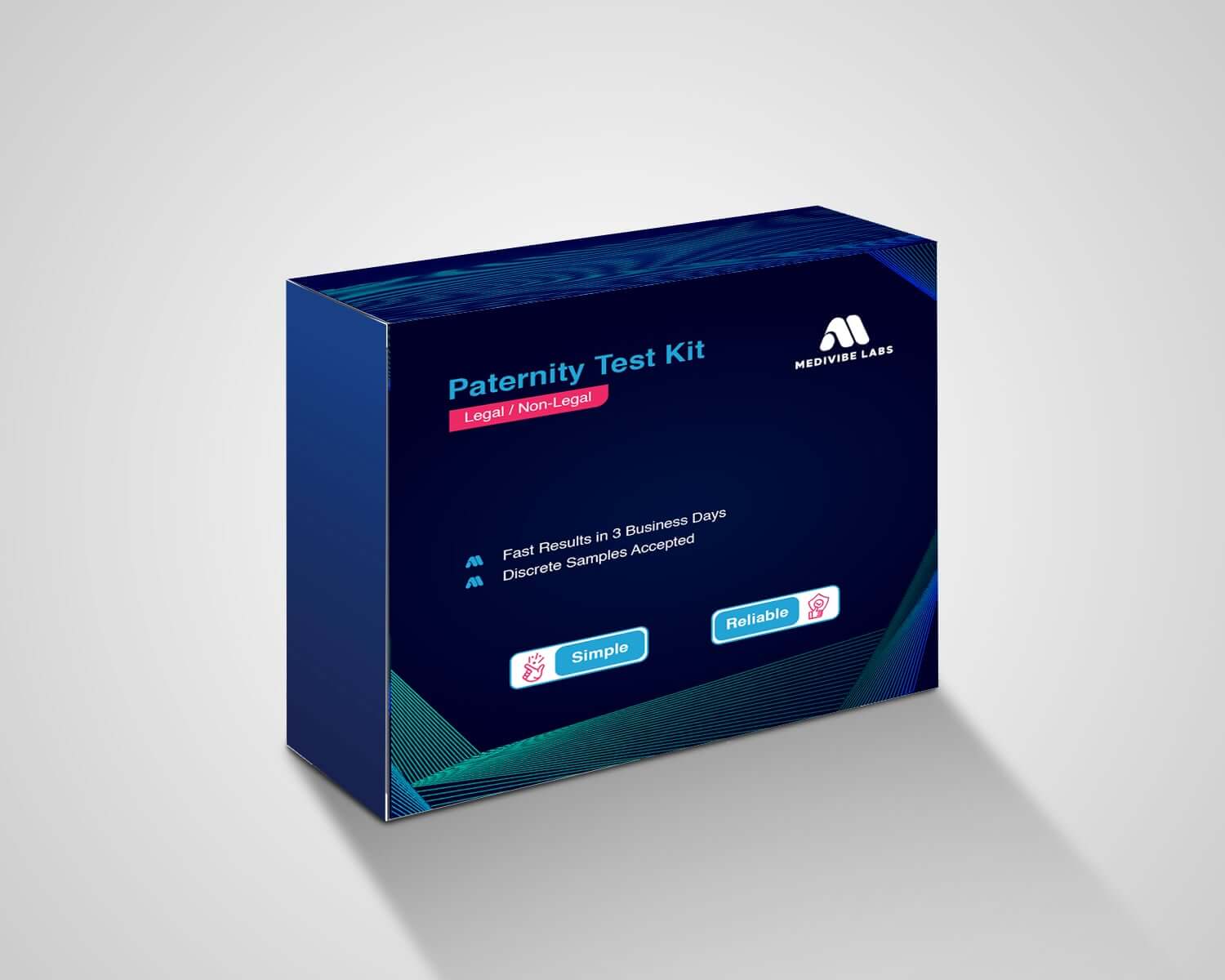Description
Advance technology
The Non-Invasive Prenatal Paternity Test (NIPPT) is the most technologically advanced test available today for determining paternity during pregnancy. Utilizing cutting-edge DNA analysis, this test examines fetal DNA found in the mother’s bloodstream, offering highly accurate results without any risk to the mother or baby. With its non-invasive nature, quick turnaround time, and advanced technology, the NIPPT provides expectant parents with a reliable and safe way to confirm paternity while ensuring peace of mind throughout the pregnancy.
benefits of Choosing Our Prenatal Paternity Test
- Non-Invasive Procedure: Our DNA test while pregnant involves a simple blood draw from the mother and a cheek swab from the alleged father, ensuring no risks to either the mother or baby.
- High Accuracy: Utilizing cutting-edge technology, our paternity test while pregnant provides highly reliable results, giving you confidence in your paternity determination.
- Quick Turnaround: Expect results in as little as one week, allowing you to gain clarity and peace of mind during your pregnancy with our fast and efficient service.
- Confidential and Secure: We prioritize your privacy, employing strict data protection measures to ensure that all personal information and results remain confidential.
- Comprehensive Support: Our dedicated team is here to guide you through the entire process, answering any questions you may have about the DNA test while pregnant.
- Legal Validity: Our paternity test while pregnant meets legal standards, making it suitable for any legal matters if necessary.
- Peace of Mind: Knowing the biological relationship before your baby arrives can reduce anxiety and improve family dynamics.
- Convenient Locations: With options for a paternity test while pregnant near me, you can easily access our services at a location that suits you.
- Flexible Payment Options: We offer various payment methods to accommodate your needs, making our services accessible and convenient.
Choosing our Prenatal Paternity Test ensures you receive a safe, reliable, and supportive solution during this significant time in your life.
The prenatal paternity test analyzes cell-free fetal DNA in the maternal blood, eliminating the risk of misdiagnosis or incorrect results related to previous pregnancies or miscarriages. This makes it significantly more accurate and reliable than other non-invasive tests that rely on nucleated fetal cells (which contain whole DNA).
Our prenatal test is 100% risk-free. It simply involves collecting a blood sample from the mother to analyze the cell-free fetal DNA. In contrast, other prenatal paternity methods, such as Chorionic Villus Sampling (CVS), are invasive and carry risks like miscarriage, leakage of amniotic fluid, or potential limb damage to the baby.
Compared to invasive sampling methods, this prenatal paternity test is quicker, more cost-effective, and easier to perform. The medical expenses associated with invasive procedures like Amniocentesis can be substantial, and they often take longer to arrange and complete.
This scientifically advanced test does not require the involvement of an OB/GYN specialist. Both Amniocentesis and CVS are medical interventions that necessitate specialist assistance and come with significant risks, which our test completely avoids.
Frequently asked questions
- What is a prenatal paternity test?
A prenatal paternity test is a safe and accurate method for determining the biological father of an unborn child by analyzing cell-free fetal DNA in the mother’s blood alongside DNA from the alleged father.
- How is the test performed?
The test involves two simple steps:
A blood sample is taken from the pregnant individual.
A cheek swab is collected from the alleged father.
These samples are then analyzed in a laboratory.
- Is the test safe for the mother and baby?
Yes, the prenatal paternity test is 100% non-invasive, posing no risks to either the mother or the baby. Unlike invasive methods, such as amniocentesis, this test does not involve any procedures that could cause harm.
- How accurate is the test?
The test is highly accurate, with results typically showing a probability of paternity. A probability of 99% or higher usually indicates that the alleged father is the biological parent.
- When can I take the test during pregnancy?
The test can be performed as early as the 8th week of pregnancy, making it accessible for expectant parents early in their pregnancy journey.
- How long does it take to get results?
Results are generally available within one week after the laboratory receives the samples.
- Will my results be confidential?
Absolutely. We take privacy seriously and implement strict measures to ensure that your personal information and test results are kept confidential.
- What if the alleged father is not available for a cheek swab?
If the alleged father cannot provide a sample, the test cannot be performed. However, alternative arrangements can be discussed, such as using a relative’s DNA for comparison.
- Is this test legally binding?
While the results can be used for personal knowledge, for legal purposes, it’s advisable to seek a court-admissible paternity test that follows specific legal protocols.
- What are the costs associated with the test?
Pricing may vary based on the provider, but our test is generally more cost-effective than invasive methods. We also offer flexible payment options to accommodate your needs.
- Can the test determine the sex of the baby?
While the primary purpose of the prenatal paternity test is to establish paternity, the analysis of fetal DNA can sometimes provide information about the sex of the baby. However, this is not the primary focus of the test.
- What happens if the test results are inconclusive?
In rare cases, results may be inconclusive due to insufficient fetal DNA in the maternal sample. If this occurs, we may recommend a retest or alternative testing methods to ensure clarity.
- Is a doctor’s prescription required for the test?
No prescription is required for the prenatal paternity test. However, we recommend consulting with a healthcare provider to discuss any concerns before proceeding.
- Can the test be done at home?
Currently, the blood sample must be taken at a medical facility, but the cheek swab can often be collected at home. We provide clear instructions for both sample collections.
- What are the limitations of this test?
While the test is highly accurate, it is important to understand that no DNA test can provide absolute certainty. Results reflect probabilities, and personal circumstances can affect interpretation.
- What if I have had previous pregnancies or miscarriages?
The prenatal paternity test analyzes only the current pregnancy’s fetal DNA, so prior pregnancies or miscarriages do not affect the results or accuracy.
- Will insurance cover the cost of the test?
Coverage varies by insurance provider. It’s best to check with your insurance company to understand your benefits and any out-of-pocket costs.
- What should I do if the test indicates that the alleged father is not the biological parent?
If the results show that the alleged father is not the biological parent, it may be beneficial to seek counseling or legal advice to navigate the emotional and practical implications.
- Are there any dietary or lifestyle restrictions before the test?
No specific dietary or lifestyle restrictions are required before taking the test. However, it’s always good to maintain a healthy lifestyle throughout the pregnancy.
- How do you ensure the accuracy of the test?
Our laboratories follow strict protocols and use state-of-the-art technology for DNA analysis. Each sample undergoes multiple tests to ensure accuracy and reliability.
- Can I speak with someone if I need support or have concerns?
Yes! Our dedicated support team is available to answer your questions and provide assistance throughout the testing process.
- What if I change my mind about the test after ordering?
You can cancel the test before the samples are collected. Once the samples are processed, results cannot be reversed, but you can discuss your concerns with our support team.
- Is there a minimum age requirement for the alleged father to provide a cheek swab?
While there is no strict minimum age, we recommend that the alleged father is mature enough to provide consent for the testing.
- How do I prepare for the blood draw?
Preparation for the blood draw is minimal. Just ensure you are well-hydrated and feel comfortable during the appointment.
- What if the alleged father is not available for a cheek swab?
If the alleged father cannot provide a sample, the test cannot be conducted. However, you may consider using a close relative’s DNA, such as a sibling or parent of the alleged father, for comparison.
- Can I take the test if I am using a surrogate?
Yes, the prenatal paternity test can still be performed if you are using a surrogate. You will need to provide DNA samples from the intended father and the surrogate.
- What kind of results can I expect?
The results will indicate either a probability of paternity (e.g., 99% or 0%) and provide a straightforward conclusion about the biological relationship between the alleged father and the fetus.
- Can this test be used for legal purposes?
While the results can provide personal confirmation, for legal paternity cases, you may need a court-admissible test that follows specific protocols and is conducted under strict legal conditions.
- What if I am uncertain about the alleged father’s identity?
If you have questions about paternity, it’s advisable to discuss your concerns with a counselor or a trusted advisor before proceeding with the test.
- How do I know if the test is right for me?
If you are seeking clarity about paternity during pregnancy and want a safe, non-invasive option, the prenatal paternity test is an ideal choice. Discussing your situation with a healthcare provider can also help.
- Are there any ethical considerations to be aware of?
It’s important to consider the emotional and relational implications of the test results. Open communication with all parties involved is crucial to navigate the outcomes sensitively.
- Can the test determine paternity if there are multiple potential fathers?
The test can still provide results for multiple potential fathers, but each individual will need to submit a DNA sample for comparison to accurately determine paternity.
- What happens if the alleged father refuses to provide a sample?
If the alleged father refuses to provide a sample, the test cannot be performed. Open dialogue about the importance of the test may help in reaching an agreement.
- How do you handle disputes over test results?
If there is a disagreement regarding the results, we recommend seeking professional mediation or legal advice to discuss the implications and potential next steps.
- Is there a customer support number I can call?
Yes! We have a dedicated customer support line available for any questions or concerns you may have about the testing process or results.
- Can the test predict health conditions for the baby?
The primary focus of the prenatal paternity test is to establish paternity. It does not screen for genetic conditions or health issues related to the fetus.
- What is the cost range for the prenatal paternity test?
Costs can vary based on the provider and specific services offered. It’s best to check with us directly for detailed pricing information.
- How often are the test procedures and technologies updated?
Our testing methods and technologies are regularly reviewed and updated to ensure we use the most advanced and reliable techniques available.
- What if I have additional questions after the test?
If you have further questions after receiving your results, our support team is always available to discuss your concerns and provide assistance.
We hope this FAQ section has addressed your questions about prenatal paternity testing. Our goal is to ensure you feel informed, supported, and confident in your decision. If you have any other inquiries or wish to proceed with testing, please don’t hesitate to reach out!





Reviews
There are no reviews yet.